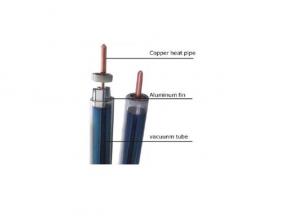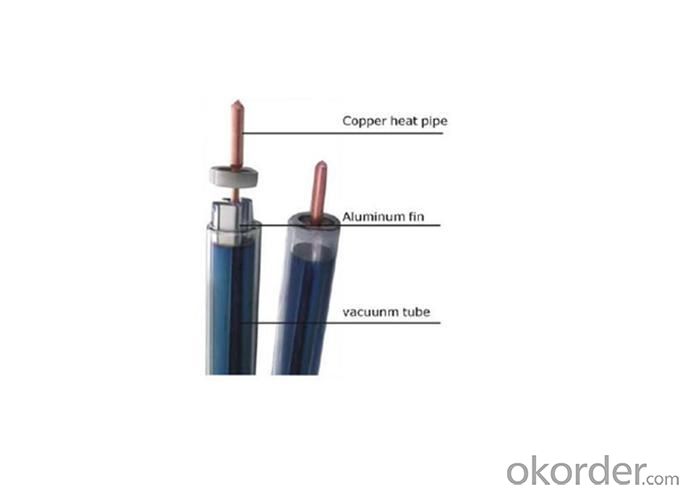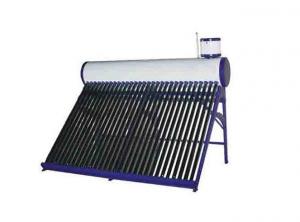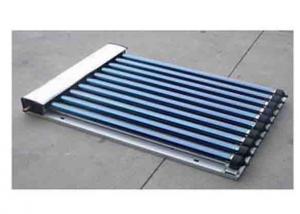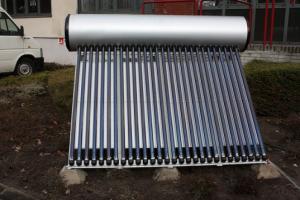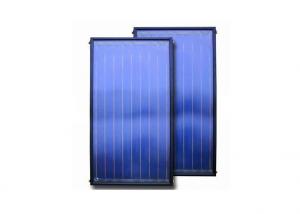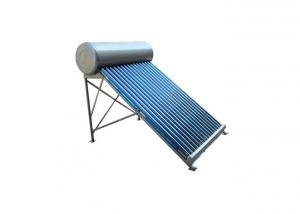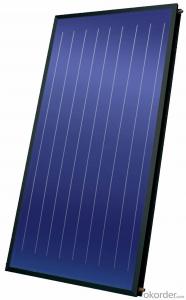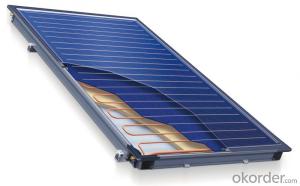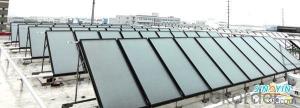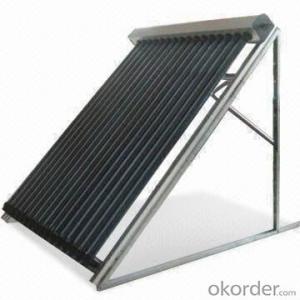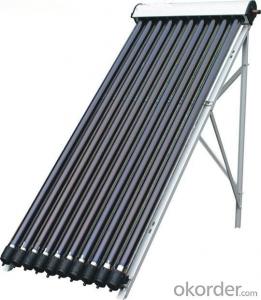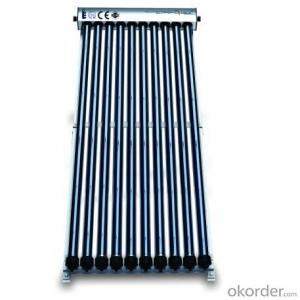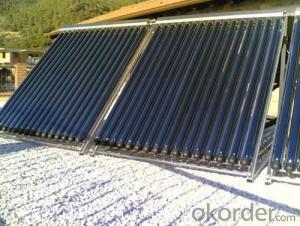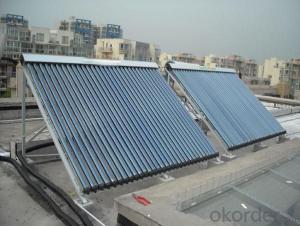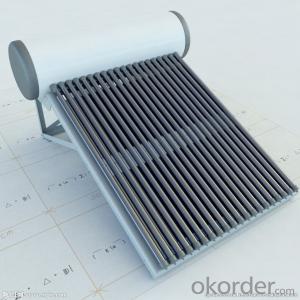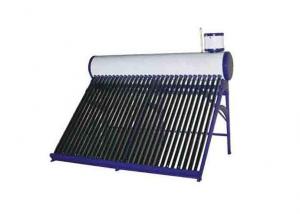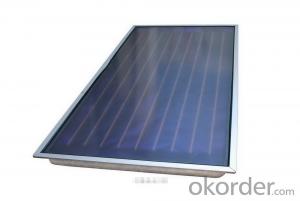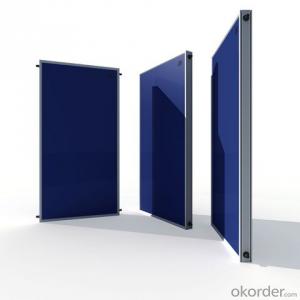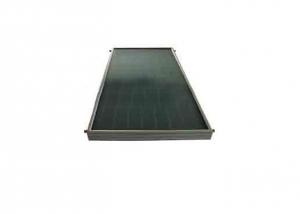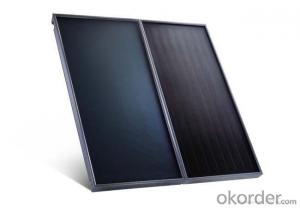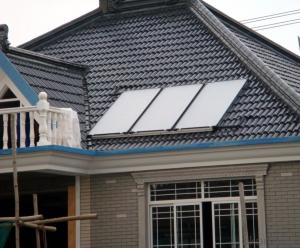Chromagen Solar Collectors Heat Pipe Vacuum Tube
- Loading Port:
- China Main Port
- Payment Terms:
- TT or LC
- Min Order Qty:
- 10 Pieces pc
- Supply Capability:
- -
OKorder Service Pledge
OKorder Financial Service
You Might Also Like
Heat Pipe Tube
1.copper heat pipe
2.3-target vacuum tube
3.aluminum sheets in
4.pressurized solar collector us
Description of Goods:
1. Materials: copper heat pipe, aluminum sheet, threee-target vacuum tube and the plastic plug.
2. Working Principle: three-target vacuum tube absorbs the solar energy then transfering the heat to the copper heat pipe inside of the tube; through the media liquid running in the copper heat pipe contact the heat energy to the cold water heater.
3. While matching with solar manifold, copper heat pipe could still using once the vacuum tube occasionally breaks
- Q: Flat solar collector how, flat solar collector working principle introduced
- pipe installation, not in the structure of the beam column, the seismic wall of the dark column, the end of the pier at the tube. Through the roof, the wall should be timely embedded casing, to avoid the waterproof insulation has been done on the roof hole
- Q: What is the ideal location for installing solar collectors?
- The ideal location for installing solar collectors is an area that receives ample sunlight throughout the day, typically facing south or southwest to maximize exposure to the sun's rays. Additionally, a location with minimal shading from trees or buildings is preferred to ensure maximum solar energy absorption.
- Q: Can solar collectors be used in remote areas?
- Yes, solar collectors can be used in remote areas. Solar energy is a renewable and abundant source of power that can be harnessed in any location with access to sunlight, making it particularly suitable for remote areas with limited or no access to traditional electricity grids. Solar collectors can be installed in these remote locations to generate electricity or heat water, providing a sustainable and cost-effective energy solution.
- Q: Can solar collectors be used for heating botanical gardens?
- Yes, solar collectors can be used for heating botanical gardens. Solar collectors can harness the sun's energy to provide heat for various purposes, including heating greenhouse structures in botanical gardens. This sustainable and cost-effective solution can help maintain optimal temperature conditions for plants and create a conducive environment for their growth.
- Q: What is the impact of altitude on the performance of solar collectors?
- The impact of altitude on the performance of solar collectors is significant. As altitude increases, the air becomes thinner, resulting in lower air density and reduced heat transfer. This can lead to a decrease in the overall efficiency of solar collectors, as the absorption of solar radiation may be less effective. Additionally, higher altitudes often experience lower temperatures, which can further impact the performance of solar collectors. Therefore, it is important to consider the altitude when designing and utilizing solar collectors to ensure optimal performance and efficiency.
- Q: How do solar collectors perform in cloudy conditions?
- Solar collectors have reduced efficiency in cloudy conditions compared to sunny conditions. When there is cloud cover, less direct sunlight reaches the solar collectors, resulting in a decrease in the amount of energy that can be harvested from the sun. Despite this, solar collectors are still capable of generating some amount of electricity or heat even in cloudy conditions. The ability of solar collectors to perform in such conditions depends on various factors, including the thickness and type of clouds, as well as the design and efficiency of the collectors themselves. Advanced solar collector technologies, like those equipped with tracking systems or concentrators, may be more effective in capturing diffuse sunlight and maximizing energy production in cloudy conditions. Additionally, certain types of solar collectors, such as those utilizing evacuated tubes or parabolic troughs, can still perform reasonably well even with limited direct sunlight. In summary, although solar collectors may not operate at their maximum capacity in cloudy conditions, they can still contribute to energy generation and serve as a valuable renewable energy source.
- Q: Can solar collectors be used in high-rise buildings?
- Yes, solar collectors can be used in high-rise buildings. With advancements in technology, solar collectors can be installed on rooftops or integrated into the building facades of high-rise structures. These collectors can harvest solar energy to provide electricity, heat water, or contribute to the building's overall energy needs. However, it is important to consider the building's orientation, shading from nearby structures, and available roof space when designing and installing solar collectors in high-rise buildings.
- Q: Can solar collectors be used in cloudy weather?
- Yes, solar collectors can still be used in cloudy weather. Although the efficiency of solar collectors may decrease in overcast conditions, they can still generate some amount of electricity or heat from the available sunlight.
- Q: Can solar collectors be installed on a flat roof?
- Yes, solar collectors can be installed on a flat roof. In fact, flat roofs are often ideal for solar panel installations because they provide ample space and easy access for mounting the collectors.
- Q: Can solar collectors be used for heating water for agricultural purposes?
- Yes, solar collectors can be used for heating water for agricultural purposes. Solar water heating systems can provide a cost-effective and sustainable solution for heating water used in various agricultural processes such as crop irrigation, livestock watering, and greenhouse heating. By harnessing the sun's energy, solar collectors can efficiently heat water, reducing the reliance on fossil fuels and lowering operating costs for farmers.
1. Manufacturer Overview
| Location | Zhejiang, China |
| Year Established | 2004 |
| Annual Output Value | US$10 Million - US$50 Million |
| Main Markets | North America South America Eastern Europe Southeast Asia Africa Oceania Mid East Eastern Asia Western Europe |
| Company Certifications | ISO 9001:2000 ;CE ;Solar Keymark |
2. Manufacturer Certificates
| a) Certification Name | |
| Range | |
| Reference | |
| Validity Period |
3. Manufacturer Capability
| a) Trade Capacity | |
| Nearest Port | Shanghai,Ningbo |
| Export Percentage | 51% - 60% |
| No.of Employees in Trade Department | 6-10 People |
| Language Spoken: | English, Chinese |
| b) Factory Information | |
| Factory Size: | 10,000-30,000 square meters |
| No. of Production Lines | Above 10 |
| Contract Manufacturing | OEM Service Offered Design Service Offered Buyer Label Offered |
| Product Price Range | Average |
Send your message to us
Chromagen Solar Collectors Heat Pipe Vacuum Tube
- Loading Port:
- China Main Port
- Payment Terms:
- TT or LC
- Min Order Qty:
- 10 Pieces pc
- Supply Capability:
- -
OKorder Service Pledge
OKorder Financial Service
Similar products
Hot products
Hot Searches
Related keywords
